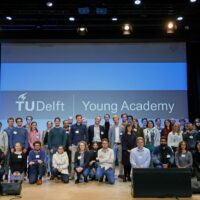Given the increasing financial pressure, the Executive Board of TU Delft recently demanded all faculties produce individual roadmaps to reduce 10% of their annual expenses.
The Delft Young Academy (DYA) seconds many strategies to save money that are currently discussed. However, we are also concerned about some of the measures currently touted. We believe that TU Delft has a special responsibility to ensure that its early career academics (ECA) flourish. The ECA trust in and identification with TU Delft will shape the latter’s ecosystem for years to come.
Given the high workloads that ECA already experience and the vulnerable position they find themselves in (see debate on ius promovendi, in Dutch), it is of particular concern that many faculties have directed their immediate attention to teaching, which is likely to disproportionately affect this group. This focus could also significantly jeopardise ongoing efforts aimed at achieving the ideal of Rewards & Recognition.
To make the financial measures sustainable without undermining the ideals of Rewards & Recognition, unevenly increasing workloads and inflating competitiveness and stress, we offer some recommendations while considering the concerns of ECA. To evolve as an institution in an inclusive and socially safe way, it is paramount in our view to take the following considerations into account.
Teaching burdens need to be fairly allocated.
The teaching duties of departing staff members should be distributed equally among all remaining staff members (both junior and senior academics). Many ways of making teaching more efficient could have detrimental effects on either educators or students, and need be balanced out somehow (see suggestions below).
There is no one-size-fits-all solution for the diverse structures of all programmes
We caution that some measures in particular could disproportionately affect those who already teach more. For instance, cutting preparation time for courses will imply a disproportionate increase in the workload of those involved in several courses, e.g. teaching focused academic career trackers and lecturers.
Educators themselves are best equipped to assess educational innovations and tailor solutions to their own and their students’ needs.
There will be no one-size-fits-all solution for the diverse structures of all programmes. The teachers themselves should be given some autonomy in evaluating the impact of any changes to their courses and be involved in the decision-making process.
In some cases, it might be possible to reduce the number of courses (electives that are outdated or not well attended), rather than increase the size of tutorials. Tutorials are important moments of social interaction and they often allow for more individually tailored and interactive education.
Travel is more important for some than for others.
It is in the interest of current and future generations that international travel is reduced. However, junior scholars have a bigger need than senior scholars to establish an international network.
The demand to reduce travel in the first funding stream must therefore specifically address senior academics. An additional responsibility arises for them to include junior scholars in their existing networks. Furthermore, a reduction of external costs linked to travel agencies is advisable.
Reduce the demands on academics in terms of their research output, grant writing, and other performance criteria.
The increasing demands in terms of teaching – even if fairly distributed – will imply additional pressure on ECA, whose mental health is already challenged. To balance these rising demands, TU Delft needs to adjust expectations regarding their performance in other domains (e.g. research and grant acquisition). Supervisors need to express that they do not expect outputs to remain the same.
Strengthen TU Delft’s resilience.
Despite these predicaments, we see opportunities to strengthen the future resilience of TU Delft. This is an opportunity to jointly establish a positive vision to strive towards as a university. The DYA is keen to contribute through workshops, world cafés, backcasting or other collaborative means of strategic foresight to increase the resilience of the institution and develop a positive vision for our future.



Comments are closed.